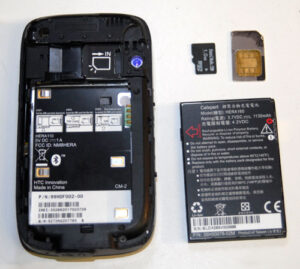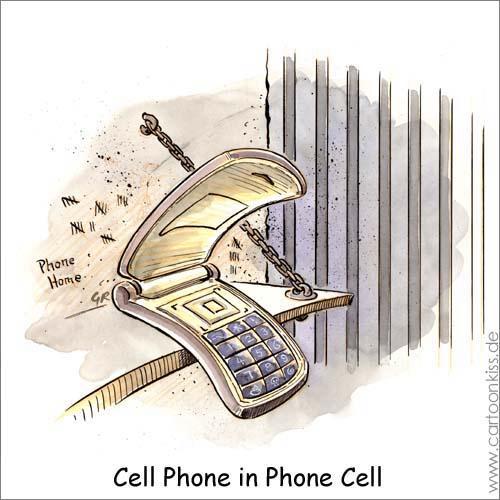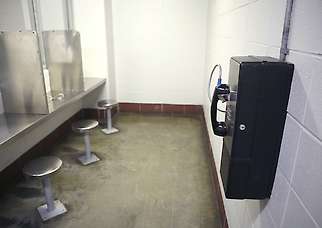 A good article below about the forensic value of a confiscated contraband prison cell phone. One clarification, however: A SIM card is not the same as a microSD card – referred to in the article as a data card. The microSD card used in most smart phones is similar to a USB storage device for your PC in that it is used to store user determined data such as documents, pictures, media, etc.
A good article below about the forensic value of a confiscated contraband prison cell phone. One clarification, however: A SIM card is not the same as a microSD card – referred to in the article as a data card. The microSD card used in most smart phones is similar to a USB storage device for your PC in that it is used to store user determined data such as documents, pictures, media, etc.
A Subscriber Identity Module (SIM) card is a portable memory chip used mostly in cell phones that operate on the Global System for Mobile Communications (GSM) network. These cards contain up to 128KB of available memory for storing the personal information of the account holder, including his or her phone number, address book, text messages, and other phone related data.
SIM cards store network-specific information used to authenticate and identify subscribers on the network. The most important of these are the ICCID, IMSI, Authentication Key (Ki), Local Area Identity (LAI) and Operator-Specific Emergency Number. The SIM also stores other carrier-specific data such as the SMSC (Short Message Service Center) number, Service Provider Name (SPN), Service Dialing Numbers (SDN), Advice-Of-Charge parameters and Value Added Service (VAS) applications. SIM cards do not store media.
SIM cards are only present in the GSM phones of carriers such as AT&T and T-Mobile. Verizon and Sprint use CDMA technology that does not require a SIM card.
Here’s a scenario that involves a triumph in contraband control. Suppose that through vigilance, shared observations and patience, you have uncovered the most insidious of contraband. You have found a smart phone inside the walls.
This is very good news, as it takes out of circulation a dangerous recorder and communicator. Firm in the knowledge that “information is knowledge,” you and your colleagues have disarmed a potential danger and enhanced safety in the facility.
Celebration seems warranted. However, there is more to do. With the evidence secured and key staff informed, the investigation begins. Some of the follow-up questions are:
• Which prisoner last had the phone?
• Did anyone else have it?
• How does the prisoner maintain a charge on the smart phone?
• Did the offender who had the smart phone work in concert with anyone else? In other words, is this a solo effort or part of a concerted effort through a security threat group?
• How did this smart phone come inside?
• Are there patterns with this incident that may aid in future searches?
With so much information to be gathered, it is easy to overlook one crucial question. Is there a data card with the smart phone?
All that one needs do is open up the phone and remove the mini card, SIM card, SD or whatever one would call it. The name is less important than its utility. The point is that it is a very small and potentially dangerous. And this part of the phone can be removed easily.
Why is this so important? Think of the data card as a removable brain in a mini computer. And this brain can be implanted in many other surprisingly easy to acquire smart phones. How can one describe the amazing storage capacity in something so small? Having all the information in the world on something the size of small coin might not be quite accurate. Still, micro storage technology is such that hundreds of pictures, contacts, texts and other data can be stored on a mini card that is smaller than a penny.
Through the eyes of corrections, let us view the nefarious utilities of data cards. The tiny titan of information storage can hold:
• Incriminating photographs of staff
• A store of all text messages sent and received
• Images that propagate gang activity
• Comprehensive directories of partners in crime
• Images of weak points in our defenses
• Maps
• Lists for store and gambling
• Potential for internet access (granted, this is only under certain circumstances)
• A working social media function
It may be that the information on an easy to hide storage chip is more valuable than the phone itself. This is not to diminish the value of an illegal smart phone in the hands of a prisoner. It just points back to the notion that information is power.
Of course, this does not mean that every micro card that one comes across will contain sensitive information. In fact, the laws of numbers dictate that somewhere and at some time a data card will be found in a jail or prison that contains virtually no useful information in terms of investigation or incrimination.
However, as with any contraband search proposition, it behooves us to continue to search for the danger that is possible. Otherwise, we may overlook a valuable clue.
Author: Joe Bouchard
Source
- Blockchain System for Compliant Inmate Transactions - March 4, 2025
- Securus Gets the Signal, Eleven Years Later - August 23, 2024
- Multi-Blockchain System for Inmate Forensics - April 2, 2024




